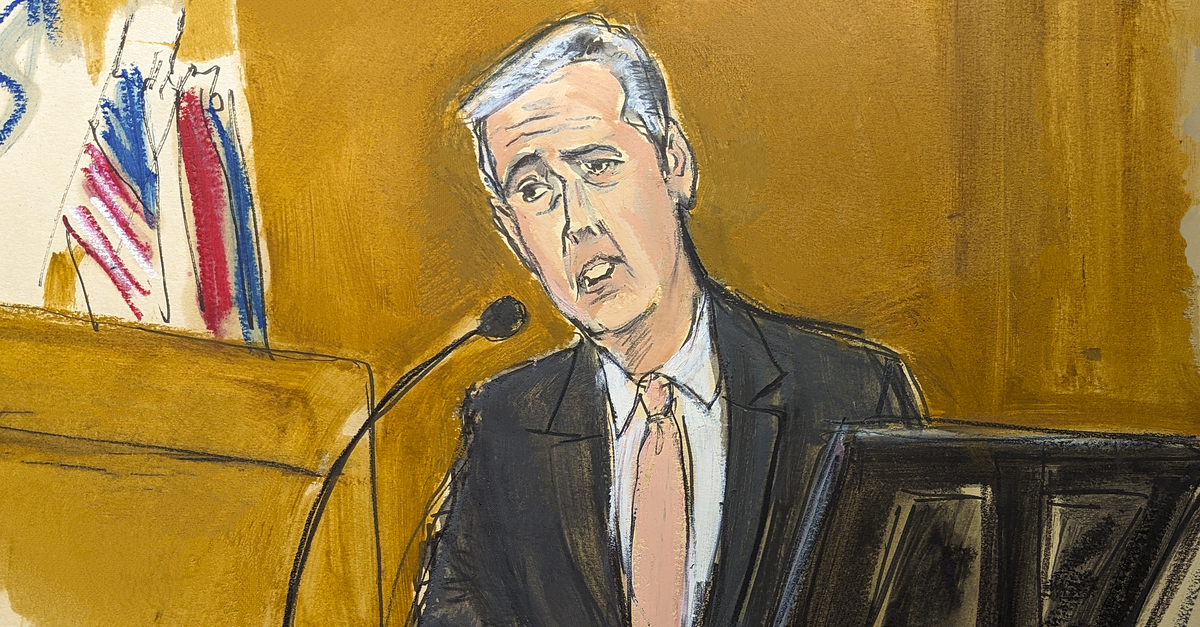
Michael Cohen testifies on the witness stand with a National Enquirer cover story about Donald Trump displayed on a screen in Manhattan criminal court, Monday, May 13, 2024, in New York. (Elizabeth Williams via AP)
Michael Cohen, 57, the former lawyer who took out a $130,000 home equity loan to pay for a year-and-a-half of silence from Stormy Daniels, 45, was called to the stand in Manhattan on Monday morning.
The day’s witness was there to provide the crux of the state’s case against former president Donald Trump, 77, his longtime former boss at the collection of companies that make up the Trump Organization.
And for years, the witness testified, seemingly earnestly and in a tone marked by the nostalgic, the experience there was largely positive. Cohen recalled general ups and downs, but mostly ups, terming his early years working for the “boss” as “fantastic” and describing the closely-held, close-knit family business as exactly that: a “big family,” according to a report by Law&Crime Network reporter Terri Austin.
The informal but intimate nature of the operation described by Cohen offers several potential pitfalls for the defendant.
Prosecutors aim to present a picture of Trump as keenly clued in to what any given underling was doing on any given matter assigned to them — especially where money was concerned.
In his testimony, Cohen described an open-door policy where he would be able to quickly duck into Trump’s office and discuss issues with him as they arose. The witness answered in the affirmative when asked if Trump was a “micromanager.” Elaborating, the witness said Trump expected his executives to report back to him promptly.
Cohen described the role he was given in 2007 as executive vice president and special counsel, for which he received a $375,000 salary — not inclusive of his a yearly bonus, according to a report by New York Daily News reporter Molly Crane-Newman.
“I would only answer to him and I [would] work on issues that were of concern to him,” the witness reportedly testified, outlining the work he did for Trump. “Whatever concerned him, whatever he wanted.”
And, in service of that role, Cohen said, for some 10 years he met with his boss “every single day,” either in person or by phone.
In addition, Cohen testified, he was also frequently in contact with others in Trump’s immediate orbit — like Rhona Graff, Trump’s executive assistant, Keith Schiller, Trump’s bodyguard, Hope Hicks, Trump’s press secretary, or Trump’s adult children.
After being assigned a task by the boss, Trump would tell Cohen to “keep me informed,” the witness testified. In order to complete those tasks, Cohen said he sometimes lied, sometimes bullied people, and replied that it was “fair” to describe him as Trump’s “fixer.”
“The only thing that was on my mind was to accomplish the task to make him happy,” Cohen told the assembled Manhattan jurors.
To easier facilitate his work, the witness testified, Trump synced his cellphone’s contact list with Cohen’s — resulting in some 30,000 contacts, according to a report by Just Security fellow Adam Klasfeld.
One of Cohen’s contacts was David Pecker, 72, the onetime CEO of the National Enquirer‘s parent company, American Media Inc. The witness testified he knew Pecker before he ever met Trump.
Cohen’s testimony quickly turned to an alleged Trump Tower meeting held in August 2015 — previously described in detail by Pecker himself.
To hear the Manhattan District Attorney’s Office tell it, Pecker and then-fledgling candidate Trump entered into an agreement that mostly benefited the GOP candidate’s campaign: directly by running positive stories about the game show host turned nativist cable news phenom; indirectly by running negative stories about his political rivals; and one-sidedly by way of the so-called “catch and kill” process wherein AMI would pay for exclusive intellectual property rights to particularly damaging stories about Trump and then sit on them.
The state has pinned the genesis of this alleged agreement to that meeting between the former publisher, the 77-year-old defendant, and his former fixer, who offered a strikingly similar estimation of what the trio discussed in Trump’s gold-accented high-rise that summer.
“What was discussed is the power of the National Enquirer in terms of being located at the cash register or so many supermarkets ad bodegas — that if we could place positive stories about Mr. Trump that would be beneficial,” Cohen reportedly said. “That if we could place negative stories about some of the other candidates, that would also be beneficial.”
The witness was ushered on to some benefits of the catch and kill arrangement — discussing a false claim leveled by a former Trump Tower doorman against the candidate. This story — which alleged Trump had fathered a child with a maid — was bought for $30,000 by AMI.
Cohen was questioned by Assistant District Attorney Susan Hoffinger. During their interactions, the two legally-trained individuals went back-and-forth to describe the ins and outs of the agreement used to silence the doorman — an agreement Cohen said he helped draft.
“I reviewed it to make sure that Mr. Trump was fully protected.” the witness testified at one point.
When asked if Trump had expressed gratitude for AMI keeping the doorman’s story under wraps, Cohen said: “Absolutely.”
Attention then turned to a story being peddled by former Playboy model Karen McDougal that she had a nearly yearlong relationship with Trump. Pecker said he advised Trump himself to purchase the rights and kill that story. Trump recoiled from the thought of paying for the story, Pecker previously testified. Eventually, after some negotiation, AMI bought up the rights to McDougal’s tale for $150,000.
“Fantastic!” Trump allegedly told Cohen upon learning a second such story had been caught killed, the witness testified. “Great job!”
On Monday, Cohen offered evidence suggesting the plan was for Trump to reimburse the publisher on that apparent job well done.
Jurors heard from a tape-recorded conversation between Cohen and Trump which the witness said was about paying back the $150,000.
“I need to open up a company for the transfer of that info regarding our friend, David, you know, so that — I’m going to do that right away,” Cohen says. “I’ve actually come up and I’ve spoken –”
To which Trump interjects: “Give it to me and get me a –”
Cohen then interjects to mention a former top Trump accountant who would later be convicted of various financial crimes: “And, I’ve spoken to Allen Weisselberg about how to set the whole thing up with –”
Again Trump interjects: “So, what do we got to pay for this? One-fifty?”
Cohen replies: “– funding. Yes. And it’s all the stuff.”
“Yes, I was thinking about that,” Trump muses on the tape.
On Monday, the prosecutor tried to tease out some context from the witness. Cohen said: “He already knew based upon conversations with David, which is why he mentioned the number 150.”
As the recording goes on, Cohen says it is important to get “all the stuff” taken care of because “you never know” about what might happen to the company or the man — before Trump cuts him off again.
“Maybe he gets hit by a truck,” Trump’s voice says on the tape.
Cohen the discusses the “financing” of the matter and the recording is slightly garbled but Trump appears to say: “Pay with cash.”
“No, no, no, no, no, I got it,” Cohen says in response.
Asked why he did not want the payment to be made in cash, Cohen said he wanted to make it looks like a “proper transaction.”
Asked why he recorded that conversation in the first place, Cohen testified it was mutually beneficial, in a sense. That conversation, he said, was needed to convince Pecker the tabloid would be paid back in order for the then-publisher to “remain loyal.”
Have a tip we should know? [email protected]








